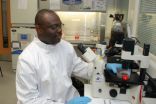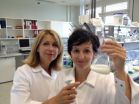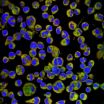(Press-News.org) THE onset of Alzheimer's disease can be slowed and some of its symptoms curbed by a natural compound that is found in pomegranate. Also, the painful inflammation that accompanies illnesses such as rheumatoid arthritis and Parkinson's disease could be reduced, according to the findings of a two-year project headed by University of Huddersfield scientist Dr Olumayokun Olajide, who specialises in the anti-inflammatory properties of natural products.
Now, a new phase of research can explore the development of drugs that will stem the development of dementias such as Alzheimer's, which affects some 800,000 people in the UK, with 163,000 new cases a year being diagnosed. Globally, there are at least 44.4 million dementia sufferers, with the numbers expected to soar.
The key breakthrough by Dr Olajide and his co-researchers is to demonstrate that punicalagin, which is a polyphenol – a form of chemical compound – found in pomegranate fruit, can inhibit inflammation in specialised brain cells known as micrologia. This inflammation leads to the destruction of more and more brain cells, making the condition of Alzheimer's sufferers progressively worse.
There is still no cure for the disease, but the punicalagin in pomegranate could prevent it or slow down its development.
Dr Olajide worked with co-researchers – including four PhD students – in the University of Huddersfield's Department of Pharmacy and with scientists at the University of Freiburg in Germany. The team used brain cells isolated from rats in order to test their findings. Now the research is published in the latest edition of the journal Molecular Nutrition & Food Research and Dr Olajide will start to disseminate his findings at academic conferences.
He is still working on the amounts of pomegranate that are required, in order to be effective.
"But we do know that regular intake and regular consumption of pomegranate has a lot of health benefits – including prevention of neuro-inflammation related to dementia," he says, recommending juice products that are 100 per cent pomegranate, meaning that approximately 3.4 per cent will be punicalagin, the compound that slows down the progression of dementia.
Dr Olajide states that most of the anti-oxidant compounds are found in the outer skin of the pomegranate, not in the soft part of the fruit. And he adds that although this has yet to be scientifically evaluated, pomegranate will be useful in any condition for which inflammation – not just neuro-inflammation – is a factor, such as rheumatoid arthritis, Parkinson's and cancer.
The research continues and now Dr Olajide is collaborating with his University of Huddersfield colleague, the organic chemist Dr Karl Hemming. They will attempt to produce compound derivatives of punicalagin that could the basis of new, orally administered drugs that would treat neuro-inflammation.
Dr Olajide has been a Senior Lecturer at the University of Huddersfield for four years. His academic career includes a post as a Humboldt Postdoctoral Research Fellow at the Centre for Drug Research at the University of Munich. His PhD was awarded from the University of Ibadan in his native Nigeria, after an investigation of the anti-inflammatory properties of natural products.
He attributes this area of research to his upbringing. "African mothers normally treat sick children with natural substances such as herbs. My mum certainly used a lot of those substances. And then I went on to study pharmacology!"
INFORMATION:
The article "Punicalagin inhibits neuroinflammation in LPS-activated rat primary microglia", by A. Olumayokun A. Olajide, Asit Kumar, Ravikanth Velagapudi, Uchechukwu P. Okorji and Bernd L. Fiebich is published by Molecular Nutrition & Food Research.
Research underway to create pomegranate drug to stem Alzheimer's and Parkinson's
Dr. Olumayokun Olajide's research will now look to produce compound derivatives of punicalagin for a drug that would treat neuro-inflammation
2014-08-22
ELSE PRESS RELEASES FROM THIS DATE:
Scientists uncover why major cow milk allergen is actually allergenic
2014-08-22
Milk allergy is frequently confused with lactose intolerance. However, these are two entirely different mechanisms that occur in the body. People with lactose intolerance do not digest lactose properly because they lack an enzyme known as lactase. In the case of the potentially much more dangerous cow milk allergy, however, the body's immune system attacks milk proteins with its own IgE antibodies.
According to statistics, about two to three percent of children in Europe suffer from a genuine milk allergy. Less adults are diagnosed with the disease. The formation of so-called ...
Study identifies challenges faced by NYU nurses after Hurricane Sandy
2014-08-22
Many recall the dramatic images of nurses at New York University's Langone Medical Center (NYULMC) heroically evacuating over three hundred patients, carrying many including the youngest and most vulnerable down flights of stairs during the power outage resulting from the storm surge generated by Hurricane Sandy.
Now, a recent study by researchers at the New York University Colleges of Nursing (NYUCN) and of Dentistry (NYUCD), published in The Journal of Urban Health examines the impact on NYULMC nurses' post-Sandy deployment to help address patient surge in eight local ...
Scientists map risk of premature menopause after cancer treatment
2014-08-22
Women treated for the cancer Hodgkin lymphoma will be able to better understand their risks of future infertility after researchers estimated their risk of premature menopause with different treatments.
The findings, set out in the Journal of the National Cancer Institute, are based on the experience of more than 2,000 young women in England and Wales treated for the cancer over a period of more than 40 years.
Previous research has suggested that women with Hodgkin lymphoma who receive certain types of chemotherapy or radiotherapy are at increased risk of going through ...
More common procedures for painful facial tics carry high costs, reports study in Neurosurgery
2014-08-22
August 22, 2014 – For patients who need surgery for facial pain caused by trigeminal neuralgia, the most cost-effective procedure is the least often used, reports a study in the September issue of Neurosurgery, official journal of the Congress of Neurological Surgeons. The journal is published by Lippincott Williams & Wilkins, a part of Wolters Kluwer Health.
Percutaneous stereotaxic rhizotomy (PSR) provides good pain relief at much lower cost than other types of surgical treatments for trigeminal neuralgia, according to the report by Dr. Siviero Agazzi and colleagues ...
Hormone analysis helps identify horny rhinos
2014-08-22
The first comprehensive study of captive black rhino reproduction in Europe highlights how hormone analysis could improve the success of breeding programmes.
Researchers from Chester Zoo, The University of Manchester and the University of Liverpool carried out a six-year study which encompassed 90% of European population of black rhino.
Dr Katie Edwards led the research as part of her PhD at the University of Liverpool. She says: "Although some black rhinoceros breed well in captivity, not all do therefore reducing the vital genetic reserve that these populations represent. ...
Poll finds many in US lack knowledge about Ebola and its transmission
2014-08-22
Boston, MA – Although the Centers for Disease and Prevention (CDC) reports no known cases of Ebola transmission in the United States, a Harvard School of Public Health (HSPH)/SSRS poll released today (August 21, 2014) shows that four in ten (39%) adults in the U.S. are concerned that there will be a large outbreak in the U.S., and a quarter (26%) are concerned that they or someone in their immediate family may get sick with Ebola over the next year.
The nationally representative poll of 1,025 adults was conducted August 13-17, 2014 by researchers at HSPH and SSRS, an ...
In our digital world, are young people losing the ability to read emotions?
2014-08-22
Children's social skills may be declining as they have less time for face-to-face interaction due to their increased use of digital media, according to a UCLA psychology study.
UCLA scientists found that sixth-graders who went five days without even glancing at a smartphone, television or other digital screen did substantially better at reading human emotions than sixth-graders from the same school who continued to spend hours each day looking at their electronic devices.
"Many people are looking at the benefits of digital media in education, and not many are looking ...
Green tea polyphenols protect spinal cord neurons against oxidative stress
2014-08-22
Green tea polyphenols are strong antioxidants and can reduce free radical damage. Can they protect spinal cord neurons against oxidative stress? Jianbo Zhao and co-workers from the First Affiliated Hospital of Liaoning Medical University, China discovered that green tea polyphenol effectively alleviated oxidative stress and inhibit neuronal apoptosis, indicating green tea polyphenols play a protective role in spinal cord neurons under oxidative stress. The relevant study has been published in the Neural Regeneration Research (Vol. 9, No. 14, 2014).
INFORMATION:
Article: ...
Recombinant adenovirus-mediated DHCR24 inhibits neural apoptosis
2014-08-22
3β-Hydroxysteroid-Δ24 reductase (DHCR24) is a multifunctional enzyme that localizes to the endoplasmic reticulum and has neuroprotective and cholesterol-synthesizing activities. DHCR24 overexpression confers neuroprotection against apoptosis caused by amyloid β deposition. Dr. Xiuli Lu and colleagues from Liaoning University in China constructed two recombinant adenoviruses (Ad-rSYN1-DHCR24-myc and Ad-hSYN1-DHCR24-myc) that drive DHCR24 expression specifically in neuronal cells. They also found that adenovirus transfection inhibits apoptosis through scavenging ...
Smokers consume same amount of cigarettes regardless of nicotine levels
2014-08-22
Cigarettes with very low levels of nicotine may reduce addiction without increasing exposure to toxic chemicals, according to a new study from the University of Waterloo.
The study published in the journal Cancer Epidemiology monitored the smoking behaviours of 72 adults as they switched to three types of cigarettes with markedly reduced nicotine levels.
Unlike when smokers switch between conventional cigarette brands—all of which have very similar levels of nicotine content—the study found no change in participants' puffing behaviour, number of cigarettes consumed ...
LAST 30 PRESS RELEASES:
Existing drugs studied in patients with rare immune diseases
Loma Linda University study reveals alarming rates of pediatric injuries from mechanical bull riding
Excessive pregnancy weight gain and substantial postpartum weight retention common in military health care beneficiaries
Odor-causing bacteria in armpits targeted using bacteriophage-derived lysin
Women’s heart disease is underdiagnosed, but new machine learning models can help solve this problem
Extracting high-purity gold from electrical and electronic waste
Tropical fish are invading Australian ocean water
No bull: How creating less-gassy cows could help fight climate change
ECU researchers call for enhanced research into common post-stroke condition
SharpeRatio@k: novel metric for evaluation of risk-return tradeoff in off-policy evaluation
$1.8M NIH grant will help researchers follow a virus on its path to the nucleus
Follow-up 50 years on finds landmark steroid study remains safe
Active military service may heighten women’s risk of having low birthweight babies
Significant global variation in national COVID-19 treatment guidelines
Cost increasingly important motive for quitting smoking for 1 in 4 adults in England
Is there an association between HPV vaccination and anti-NMDA receptor encephalitis?
Blood-based multi-omics guided detection of a precancerous pancreatic tumor
Eye-opener: Pupils enlarge when people focus on tasks
Current Nanomaterials and Current Analytical Chemistry have been indexed in Ei Compendex
International balance of power determined by Chinese control over emerging technologies, study shows
New writing therapy helps late-stage cancer patients face biggest fears
National Jewish Health researchers identify connection between air pollutants and allergic diseases
In the United States, the election of progressive prosecutors led to higher relative rates of property and overall crime, but not to higher relative rates of violent crime
European Court of Human Rights is “backsliding” on legal protections for asylum seekers, study says
Being treated by a female physician associated with lower risk for death
Treatment from female doctors leads to lower mortality and hospital readmission rates
Historically redlined areas see more modern-day gun violence
Bonobos aren’t as peace-loving as we thought
Abdominal obesity might predict risk of fecal incontinence
Smartphone swabs provide convenient toxicology testing
[Press-News.org] Research underway to create pomegranate drug to stem Alzheimer's and Parkinson'sDr. Olumayokun Olajide's research will now look to produce compound derivatives of punicalagin for a drug that would treat neuro-inflammation





